India plans wheat import from Russia as food inflation bites

Business
Retail inflation in July rose to 7.44pc, its highest in 15 months
NEW DELHI/MUMBAI (Reuters) – India is in talks with Russia to import wheat at a discount to surging global prices in a rare move to boost supplies and curb food inflation ahead of state and national elections next year, according to four sources.
The imports would allow New Delhi to intervene more effectively in the market to drive down wheat prices that stoked inflation to a 15-month high in July.
On the other hand, Business Standard newspaper, citing Finance Secretary T V Somanathan, reported that India will take a medium-term view to intensify efforts to ease inflation pressures and avoid any knee-jerk reaction to transitory price increases,
The government has taken a few measures to control inflation. The measures are ongoing and will be intensified, Somanathan told Business Standard, adding that the decisions have to be taken with a medium-term view and not based on the data for one-two weeks or months.
Meanwhile, one of the sources told Reuters, when asked about wheat imports from Russia, said "The government is exploring the possibility of imports through private trade and government-to-government deals. The decision will be made cautiously,"
India has not imported wheat through diplomatic deals in years. The last time India imported a significant amount of wheat was in 2017, when private traders shipped in 5.3 million metric tons.
The government's plan to import Russian wheat is one of the supply-side measures being considered to bring down prices of key commodities like fuel, cereals and pulse along with an extension of rural schemes to ease the impact of inflation on the poor, two of the sources with knowledge of the matter said.
Sources did not want to be named as the discussions are private and the final decision might be weeks away. India's finance, trade and government spokespersons did not reply to emails and messages seeking comment.
Last month, Sanjeev Chopra, the most senior civil servant at the federal food ministry, said there was no proposal to import wheat from Russia.
LOW WHEAT STOCKS
Although India needs only three million to four million metric tons of wheat to plug the shortfall, New Delhi might consider importing eight million to nine million tons of wheat from Russia to have a far bigger impact on prices, another source said.
Since the war in Ukraine last year, Russia has become India's second biggest seller of goods mainly on account of discounted oil purchases by New Delhi.
"Russia has indicated its willingness to offer a discount on prevailing market prices. There are no restrictions on the export of food commodities from Russia," one official said.
India is also importing sunflower oil from Russia and settling payments in US dollars and is planning to use the same approach, the official added.
"India can easily secure a discount of $25 to $40 per ton from Russia. This will ensure that the landed cost of wheat remains significantly below local prices," said a dealer based in Mumbai with a global trade house.
Wholesale wheat prices in India surged around 10pc over two months to a seven-month high in August on limited supplies.
Wheat stocks at government warehouses were at 28.3 million tons on Aug. 1, 20pc below the 10-year average.
Last year, India banned wheat exports due to lower output, and this year's crop is also expected to be at least 10pc lower than the government's estimate.
RETAIL INFLATION
India's retail inflation in July rose to 7.44pc, its highest in 15 months, breaching the Reserve Bank of India's upper tolerance level of 6pc for the first time since February 2023, as food and vegetable prices surged in the country.
"We are engaging in substantial open market sales of both wheat and rice to control food inflation," said Somanathan, adding that special measures of market intervention in vegetables, pulses and oil seeds are also being taken to cushion the impact.
India will offer 5 million metric tons of wheat and 2.5 million tons of rice to bulk consumers in an attempt to cool domestic prices and restrict exports of both staples.
"I think inflation would be reduced in the next three months," Somanathan said. The surge in prices is a temporary seasonal phenomenon, he added.
The finance secretary did not immediately respond to Reuters request for comment.

